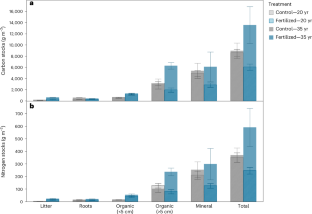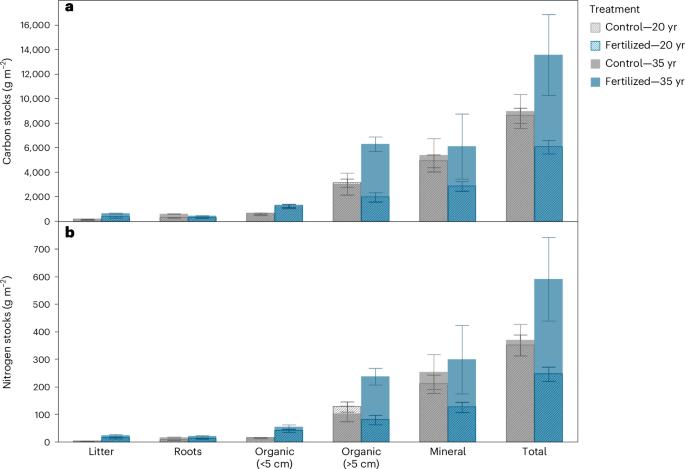Arctic soil carbon trajectories shaped by plant–microbe interactions
IF 29.6
1区 地球科学
Q1 ENVIRONMENTAL SCIENCES
引用次数: 0
Abstract
Rapid warming in the Arctic threatens to amplify climate change by releasing the region’s vast stocks of soil carbon to the atmosphere. Increased nutrient availability may exacerbate soil carbon losses by stimulating microbial decomposition or offset them by increasing primary productivity. The outcome of these competing feedbacks remains unclear. Here we present results from a long-term nutrient addition experiment in northern Alaska, United States, coupled with a mechanistic isotope-tracing experiment. We found that soil carbon losses observed during the first 20 years of fertilization were caused by microbial priming and were completely reversed in the subsequent 15 years by shrub expansion which promoted an increasingly efficient carbon–nitrogen economy. Incorporating long-term stoichiometric responses in Earth system models will improve predictions of the magnitude, direction and timing of the Arctic carbon–climate feedback. Arctic warming is thought to lead to large losses in soil carbon stocks. Here a 35-year-long fertilization experiment in Alaska shows that increased shrub productivity and changes in plant–microbial feedbacks may eventually reverse trends of carbon loss and restore the soil carbon sink.


植物与微生物相互作用形成的北极土壤碳轨迹
北极地区的快速变暖有可能将该地区大量的土壤碳释放到大气中,从而加剧气候变化。养分供应的增加可能会通过刺激微生物分解而加剧土壤碳的流失,也可能通过提高初级生产力而抵消土壤碳的流失。这些相互竞争的反馈结果尚不清楚。在此,我们介绍了在美国阿拉斯加北部进行的一项长期养分添加实验以及一项机理同位素追踪实验的结果。我们发现,在施肥的前 20 年中观察到的土壤碳损失是由微生物引诱造成的,而在随后的 15 年中,灌木的扩展促进了碳氮经济的日益高效,从而完全扭转了这一趋势。将长期的化学计量反应纳入地球系统模型将改善对北极碳-气候反馈的幅度、方向和时间的预测。
本文章由计算机程序翻译,如有差异,请以英文原文为准。
求助全文
约1分钟内获得全文
求助全文
来源期刊

Nature Climate Change
ENVIRONMENTAL SCIENCES-METEOROLOGY & ATMOSPHERIC SCIENCES
CiteScore
40.30
自引率
1.60%
发文量
267
审稿时长
4-8 weeks
期刊介绍:
Nature Climate Change is dedicated to addressing the scientific challenge of understanding Earth's changing climate and its societal implications. As a monthly journal, it publishes significant and cutting-edge research on the nature, causes, and impacts of global climate change, as well as its implications for the economy, policy, and the world at large.
The journal publishes original research spanning the natural and social sciences, synthesizing interdisciplinary research to provide a comprehensive understanding of climate change. It upholds the high standards set by all Nature-branded journals, ensuring top-tier original research through a fair and rigorous review process, broad readership access, high standards of copy editing and production, rapid publication, and independence from academic societies and other vested interests.
Nature Climate Change serves as a platform for discussion among experts, publishing opinion, analysis, and review articles. It also features Research Highlights to highlight important developments in the field and original reporting from renowned science journalists in the form of feature articles.
Topics covered in the journal include adaptation, atmospheric science, ecology, economics, energy, impacts and vulnerability, mitigation, oceanography, policy, sociology, and sustainability, among others.
 求助内容:
求助内容: 应助结果提醒方式:
应助结果提醒方式:


